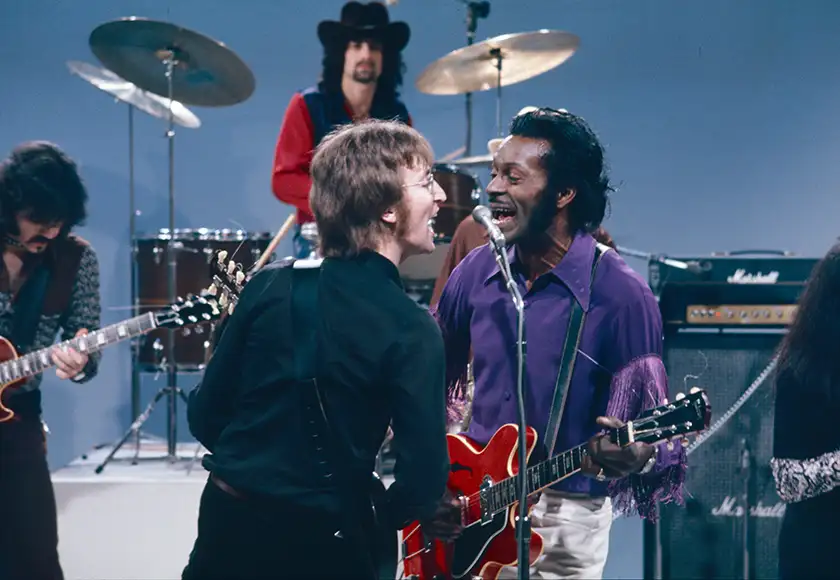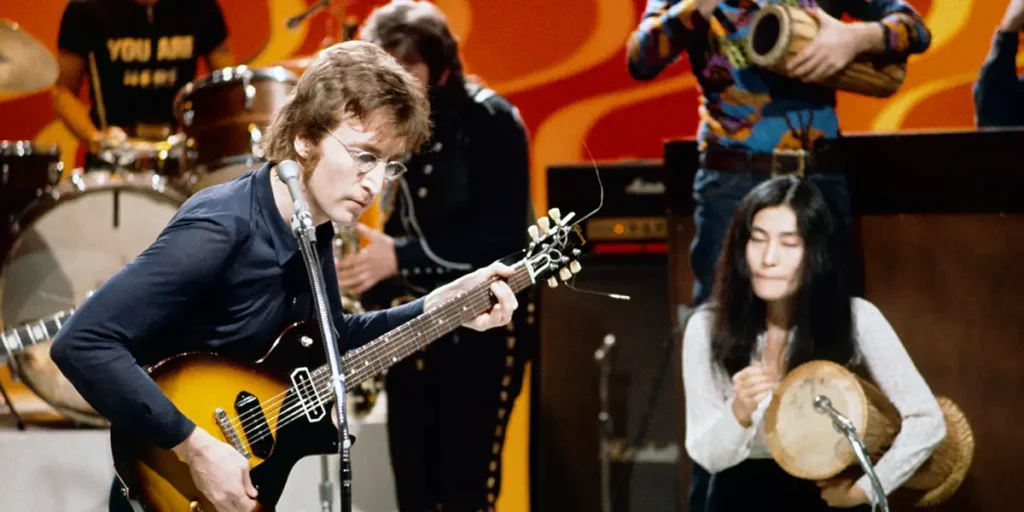Daytime Revolution promises to show us a radical week when Lennon and Yoko take over a talk show. But Gil Scott-Heron was right: the revolution will not be televised.
Director: Erik Nelson
Genre: Documentary, Biographical
Run Time: 108′
US Release: October 9, 2024
UK Release: TBA
Where to watch Daytime Revolution: in select US theaters
The Beatles broke up in 1970, John Lennon and his wife Yoko Ono moved to the West Village in 1971, Lennon released “Imagine” several months later while the married couple ingratiated themselves in social movement politics. That scene post-Woodstock, post-Altamont, was becoming cynical and sarcastic. Nixon was president and loathed anyone non-WASP, not rich, and not square.
In the meantime, Mike Douglas, not Michael, was hosting “The Mike Douglas Show,” which broadcast from Philadelphia to forty million Americans (who leaned closer to Nixon than Lennon socially and politically) per week, making it the number one daytime talk show. Douglas had ambitious show bookers and Lennon, with Yoko, wanted a creative public outlet to discuss social issues, so they agreed to co-host the show for a week with Lennon and Yoko having full control over the guests.
The five shows from Monday to Friday were gearing up to a friendly clash between the stodgy nineteen-fifties and their acid-pilled children. Such is the way Erik Nelson sets up his newest documentary, Daytime Revolution. Both show and documentary promise us chaos, utter disruption to the status quo, and a radical take on daytime television. Guests included Jerry Rubin and Bobby Seale, “radicals” who most Americans knew by way of sensational journalism and overt racism, as well as Ralph Nader, Chuck Berry, George Carlin, and a smattering of young musicians, hippie-adjacents, and one macrobiotic chef.
Mike Douglas is a somewhat forgotten television personality today relative to his viewing figures. He began his career singing on the radio, which grew into singing on television, then hosting small entertainment shows, and finally his own daytime talk-show in Cleveland. “The Mike Douglas Show” became syndicated in just three years and moved to Philadelphia two years after that. Its popularity was due to his ability to sing a song to begin every show and have famous co-hosting guests every week. No stranger to inviting irreverent co-hosts – one time even having on…an atheist! – Douglas was always calm and collected with everyone, no matter how famous or controversial. Lennon and the gang would put that to the test.
Nelson started his career in television production (“Ripley’s Believe It or Not!”, “Mega Disasters”) before producing four of Werner Herzog’s films, including Grizzly Man. Having received one of the greatest film schools through observing the legendary Munich-born director, Nelson went on to direct his own documentaries about David Crowley and World War II. Nelson first became interested in Lennon and Yoko co-hosting “The Mike Douglas Show” when he produced a television show about the married couple’s deportation trials directed by Nixon. This week in February 1972 was what directly led to that years long legal battle and Nelson felt that that story remained untold.

Nelson opens Daytime Revolution with contextual footage: an Attica benefit concert in 1971 with Lennon and Rubin performing on stage together followed by typical news-footage of the era (George Wallace, Nixon’s re-election, and Vietnam). So far so good, the documentary doesn’t fall too much into the “Best of 1972”-type nostalgia content that one finds on magazines in grocery stores’ checkout lines, even with its flower-power title graphics. Without wasting much time, Nelson begins interviewing several guests and one show producer who are still around. They talk about their experiences in standard-fare interview formats, sometimes watching their past performance for the first time in five decades.
After ten minutes of intros and news footage contextualization, Daytime Revolution plays an extended clip of Lennon and Yoko introduced as co-hosts, which runs nearly uninterrupted for ten minutes. Douglas is the most relaxed, Yoko is nervous, and John is chewing what seems like the same piece of gum for all five shows. The bright idea that Nelson conceived as the cornerstone for this documentary was allowing the clips to breathe as much as possible. In an era where everything is clipped and cropped, Nelson reverses course and returns us to a time where television was advertising the wares of the conglomerate who owned the station rather than BlueChew and ZipRecruiter.
Similarly to how Nelson used these long takes for Daytime Revolution, whose footage was restored under the supervision of Yoko and their son, Sean Lennon, the show allowed these supposedly controversial guests to be humanized. The most hazardously temperamental guest was supposed to be Jerry Rubin, who Lennon and Yoko befriended during their New York socio-political life. Rubin’s reputation in 1972, before turning Wall Street stockbroker by the end of the decade, was that of a counter-culture radical who co-founded the Yippies and stood trial for inciting riots outside the 1968 Democratic National Convention in Chicago. Although Rubin made some poignantly sharp critiques of the oppressive social life in Nixon’s America, Douglas defanged him by asking him about his parents and the good he finds in others.
Bobby Seale was likewise, but for more racist reasons, a misunderstood figure who came across as gentle yet passionate in defending black Americans against injustices. Known for co-founding the Black Panther Party for Self-Defense, white Americans often didn’t care about the last three words, sensationalist dog-whitlers smeared Seale and his affiliates with inciting violence against whites for arming themselves in response to police brutality. Although first starting out as a police watch-dog group, the Black Panthers started distributing food and clothing to those in need in the inner cities, which Seale talked about on the show.
Due to his political popularity then and now, including the talking-head present-day interview with Nelson, Ralph Nader is a standout in Daytime Revolution. Among many other public advocacy groups, Nader was and still is a strong advocate for consumer rights. Asked by Nelson whether he finds it dismaying that things feel worse now than in 1972, Nader confirms his hope for the future and those fighting for a better one. Another high point among the guests was Chuck Berry, the father of rock & roll and idol of Lennon. Other than a shriekingly atonal vocal performance by Yoko while Berry and Lennon were jamming with the band, the plum shy Berry was delighted to play the 45-year-old veteran guest of the host.
Before one knows it, the five days are up and the promise of chaos, disruption, and revolution at 4 P.M. never happened. The radical thing that was done instead was humanizing a group of leftists who had been continuously slandered in the recent past by the conservative silent majority. Their personalities and vulnerabilities, expertly and invisibly cleaved out by Mike Douglas, were fed directly into the homes of much of that majority. As Gil Scott-Heron wrote just two years prior to this February week in 1972, the revolution will indeed not be televised.
While Douglas, along with Lennon and Yoko, may or may not have pulled off this radical humanizing message, Nelson could’ve followed suit in Daytime Revolution by presenting a radical vision of a genre and era that has been filmed and edited together ad infinitum. Given the success of Peter Jackson’s 468-minute documentary The Beatles: Get Back, as well as Nelson’s proclivity to play clips extended in full context, the radical move would have been a 300-minute documentary that skillfully interweaves the footage, the interviewees watching their younger selves, and occasional commercial break news footage of war crimes in Southeast Asia.
Daytime Revolution will be released in US theaters in over 50 cities on October 9, 2024 for John Lennon’s Birthday.

